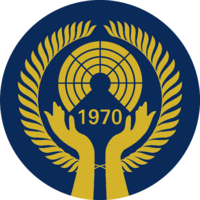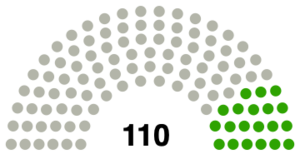Union Assembly: Difference between revisions
mNo edit summary |
mNo edit summary |
||
| Line 7: | Line 7: | ||
|coa_res = 200px | |coa_res = 200px | ||
|session_room = | |session_room = | ||
|house_type = Unicameral | |house_type = Unicameral legislature | ||
|body = Union of Zomia | |body = Union of Zomia | ||
|leader1_type = Chairman | |leader1_type = Chairman | ||
Revision as of 03:47, 22 December 2021
This article is incomplete because it is pending further input from participants, or it is a work-in-progress by one author. Please comment on this article's talk page to share your input, comments and questions. Note: To contribute to this article, you may need to seek help from the author(s) of this page. |
Union Assembly | |
|---|---|
 | |
| Type | |
| Type | Unicameral legislature of the Union of Zomia |
| Leadership | |
Chairman | |
| Structure | |
| Seats | 110 |
 | |
Political groups | Government (335)
|
Length of term | 5 years |
| Elections | |
| Single non-transferable vote for ruler-nominated candidates | |
Last election | 17th March 2017 |
Next election | 17th March 2022 |
The Union Assembly is a quasi-parliamentary consultative body, consisting of twenty hereditary chieftains representing the autonomous tribal regions, and ninety directly elected councillors; ten from each of the princely states. Constitutionally, the Assembly is the unicameral legislature of the Union of Zomia, directly elected by universal suffrage, though in practice its independence from the Executive Council is limited, as all candidates must be nominated by their ruling prince. According to the International Council for Democracy the "the process of nomination is opaque, and voter intimidation is rife." Turnout is mandatory in seven of the nine princely states, and Zomi elections have been described by human rights groups as unofficial censuses, intended to enforce conscription and unfree labour obligations on Zomia's semi-nomadic swiddening population.